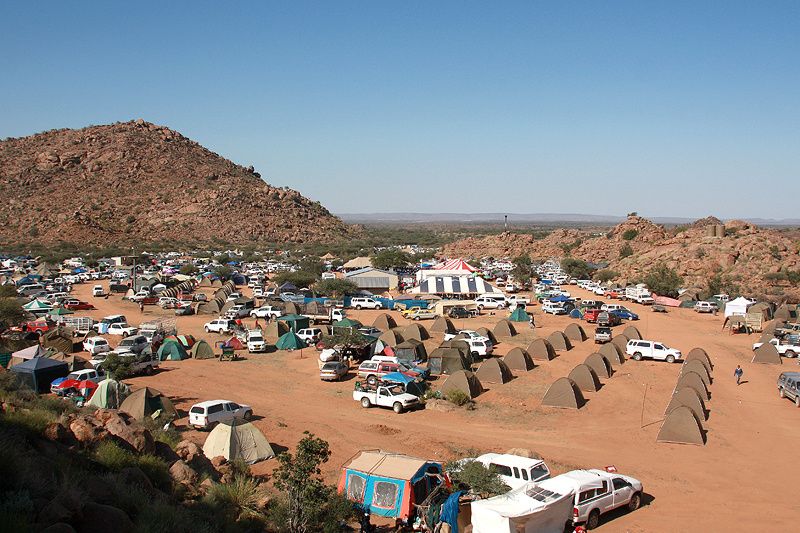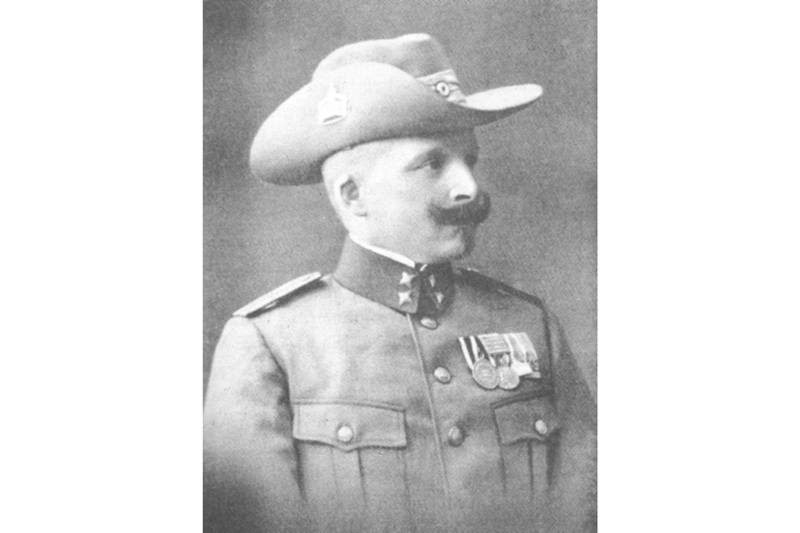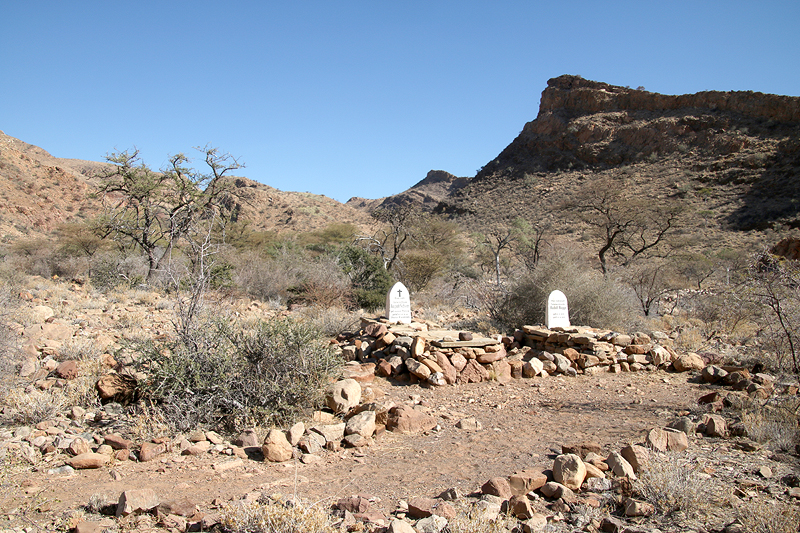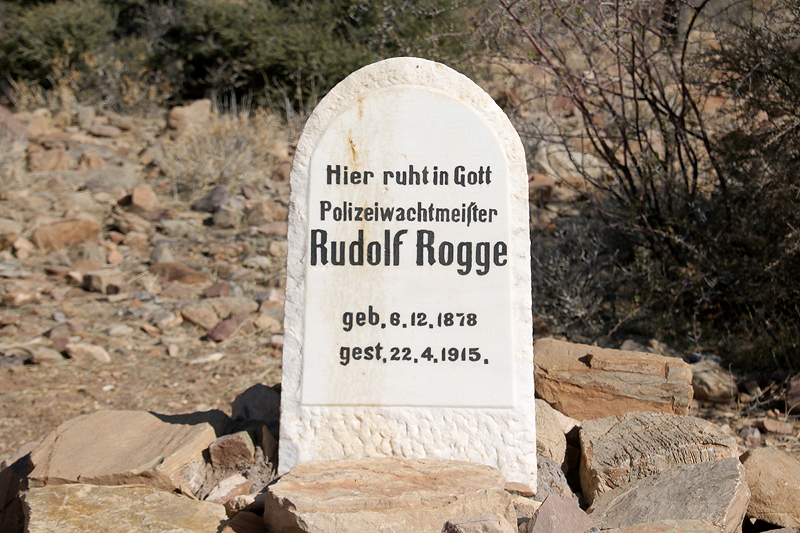Annual commemorations and the memorial of Sam Khubis recall the skirmish between Rehoboth Basters and Germans 105 years ago today. Only a gravestone and a book testify to the violent death of the constable of the BüllsPort police station 18 days earlier…
8 May 1915, Sam Khubis, about 80 km southwest of Rehoboth. The First World War, which raged in Europe, also pulled the Basters in the German colony of South West Africa into its destructive turmoil.
Hundreds of fighters entrenched themselves on the northeast slope of the valley basin at Sam Khubis. The German protection force attacked from the opposite hills.
After hours of fighting, the Basters had to flee their positions. They gathered for prayer and asked God for rescue. And they could hardly believe their eyes: The Germans did not follow them, but withdrew…
Advancement of the South Africans
What happened? The German Schutztruppe (protection force), about 4,000 men strong, actually had a completely different opponent: the South African army, which was on the advance with 60,000 soldiers. South Africa had made a secret pact with Great Britain and wanted to annex the neighboring German colony.
The Basters feared for their future. Under German rule, they enjoyed extensive special rights due to a “protection and friendship contract”. At the same time, they were obliged to assist the Germans in the event of conflicts with third parties.
Basters caught in the middle
That put them in a catch-22 situation. If they terminate their contract, they would incur the Germans’ wrath. If they fight by their side and the South Africans prevail, they would face punishment – and lose their priviledges. Already back in September 2014, the protection force had to assure them that the so-called bastard company would not be deployed at the front, but only behind the lines.
The Baster’s discontent had been growing since the beginning of 1915. A part of the “bastard company” had to guard South African soldiers, whom the Schutztruppe had captured in a preliminary skirmish. The South Africans threatened their guards with retribution. On the night of 17 to 18 April, the Baster soldiers left their posts and camp.
Attack at Büllsport
As of 19 April, while German Schutztruppe and the Baster council were still negotiating disarmament of the Baster people, Baster commandos killed German men in Basterland. Their targets were farmers and police officers in remote police stations such as Büllsport. Farms were looted.
Subsequently the Schutztruppe started a punitive action. In one case, women and children were shot, including the son of a leading Baster. The punitive action culminated in the skirmish at Sam Khubis on 8 May.
However, the German units had no time to persecute the Basters. They learned that South African troops were advancing on Windhoek. In order not to be cut off from the core of the Schutztruppe, they had to proceed toward Windhoek as quickly as possible. Two months later, on 9 July 1915, the Schutztruppe capitulated at Khorab north of Otavi.
Memorial at Sam Khubis

The Rehoboth Basters gather at their memorial in the valley basin of Sam Khubis. Photo (2015): Sven-Eric Stender
The Rehoboth Basters keep their word that they gave to God in their prayer at that time: Every year on 8 May, a memorial service takes place in the valley basin of Sam Khubis. Among the participants are Namibians of German origin.
Because of the restrictions due to the corona virus, there is only a ten-member delegation on site today. The service takes place in Rehoboth in front of empty benches and is broadcast online (for the video on Facebook please click here).
Book chapter on Büllsport

Police constable Rudolf Rogge, taken around 1912. Photo source: Kuno Budack, “Krieg und Frieden im Basterland”, Windhoek 2015, p. 365
A tombstone on the premises of BüllsPort Lodge & Farm commemorates the police constable who was the first victim of the assaults: Rudolf Rogge. However, it states an incorrect date and remains silent about the circumstances of his death.
The events at Büllsport are only described in a book that was published in 2015, to commemorate the 100th anniversary of the violent conflict: “Krieg und Frieden im Basterland” (“War and Peace in Basterland”) by Kuno Budack. The author reconstructed the events from military reports, interrogation minutes and conversations with contemporary witnesses and their descendants.
Death of a policeman
According to the book, on the evening of 19 April two Basters came to Büllsport with the order to kill Rogge. Slightly away from the police station, they recruited three accomplices, including the station’s two auxiliary constables.
The next morning, these three accomplices went to the police station. Rogge was not suspecting any evil. His two subordinates handed him a letter to distract him.
The third man walked past him, suddenly threw a noose over his head from behind and pulled it shut. He and one of the auxiliary policemen grabbed Rogge while the other policeman shot at him several times. Finally the two Basters come up to them and give the badly wounded Rogge the coup de grâce.
Grave and book recall Rogge
The 36-year-old Constable’s grave is located near the ruins of the former police station. So guests of the “Old Police Station” campsite only need to take a few dozen steps to find traces of the First World War even in this remote valley.
The book “Krieg und Frieden im Basterland” by Kuno Budack was published in 2015 by Padlangs Publications in Windhoek (in German only). Contact: padlangs@iway.na. More about the history of the Basters is to be found in the museum in Rehoboth.

Graves of Constable Rudolf Rogge (right) and non-commissioned officer August Schern, who died in the Naukluft mountains during the war against the Witbooi-Nama in 1894. Photo: Sven-Eric Stender
Newsletter “Naukluft Mail”
Straight from the Naukluft to your mailbox: News, information and exciting stories about the guest business and farm operations of BüllsPort, as well as the mountains of the Naukluft. Subscribe to our quarterly newsletter “Naukluft Mail”.


